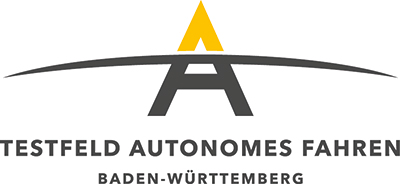KIGLIS
Artificial intelligence methods for the optimization of fiber optic networks using the example of a smart city
Start: 10/2016
End: 12/2021
The Test Area Autonomous Driving Baden-Württemberg (TAF BW) is a real-life laboratory for mobility concepts designed to promote the development of future-oriented solutions for individual and public transit. Companies and research institutions can test their technologies and services related to connected and automated driving in everyday traffic with automated cars, buses or commercial vehicles like street cleaning or delivery services.
In contrast to other projects in Germany, the test field, which went into operation in May 2018, covers all types of public roads: Highway sections, state and federal roads, inner-city routes with cycling, pedestrian and tram traffic as well as speed-30 zones, residential areas and parking garages. The test field routes are located between Karlsruhe, Bruchsal, and Heilbronn.
A particular focus of the Test Area Autonomous Driving Baden-Württemberg is local public transportation. This is because the state of Baden-Württemberg plans to significantly expand rail and bus services in the coming years as part of a public transportation initiative. The planned measures also include intensive testing of concepts with automated, driverless mobility services.
The conception, planning and expansion of the Test Area Autonomous Driving Baden-Württemberg is being implemented by a consortium consisting of the FZI Research Center for Information Technology, the City of Karlsruhe, the Karlsruhe Institute of Technology, Karlsruhe University of Applied Sciences, the Fraunhofer Institute of Optronics, System Technologies and Image Exploitation IOSB, Heilbronn University of Applied Sciences, and the City of Bruchsal, as well as other associated partners of the test field. The test area is operated by the Karlsruhe Transport Authority (KVV).
The FZI is the consortium leader and contributes know-how in the perception of road users in intersections, the networked infrastructure and IT data management. In addition, the existing research vehicles will also be made available to interested test area users as sensor carriers and research platforms. The issue of data protection and the legal framework are also being studied and taken into account by the FZI staff.
Smart solutions for the transportation of people and goods are a focus of FZI research to shape mobility in the future. To this end, the FZI develops integrated mobility systems – from vehicle automation and the application of AI in traffic systems to urban mobility and logistics.

Funding notice:
The Test Area Autonomous Driving (TAF BW) project was funded by the Ministry of Transport.
It is also funded by the Ministry of Science, Research and Arts (MWK).
Project partners:
Some research projects use the infrastructure of the real laboratory Test Area Autonomous Driving Baden-Württemberg.
Artificial intelligence methods for the optimization of fiber optic networks using the example of a smart city
Artificial intelligence for selective real-time recording of scenario and maneuver data during the testing of highly automated vehicles
Networked and automated mini-buses for the last mile from the bus stop to the front door